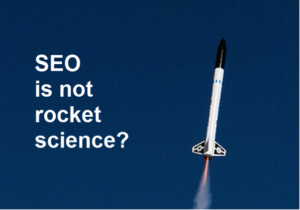
Google gets 6 billion searches a day, making search engine optimization absolutely essential for building trust and authority. Gone are the days when having a website and being listed in the search engines was nice, but not a requirement.
If you want to be a true thought leader, then you need to provide high-quality results when people search for your name, your company name, and the topics that you are associated with. If you are not at the top of the results, then you are missing out on one of the largest media channels in the world.
What is SEO?
Search engine optimization is when you intentionally adjust your website and create content with the goal of raising your status in search engines. Thankfully there are plenty of SEO agencies who can handle the technical components for you. I recommend that you focus on developing authoritative content and leave the technical stuff to the people who obsess over it daily.
Technical SEO – Not rocket science, but almost
Last week I had a call with one of my customers that I wish I could have recorded to share with you. There were five of us on the call, including their marketing and development person, and we were talking about the 14,000 crawl errors listed in their Google Webmaster Tools account. GWT lets you look at a variety of technical issues on your site, including whether or not Google can properly see or “crawl “ each of your pages.
The conversation would have sounded completely ridiculous to outsiders. We were practically talking in programming code. Rick Floyd, one of my team members, was explaining Regex syntax, which is sometimes used when writing 301 redirects, and he was sketching it out along the lines of the following:
^ and (.*) and \w{3,}?$
I’ll be honest, it went over my head, and so I’m thankful to have people even more technical than me on my staff.
Below is a list of technical SEO issues just to give you a feel for what is involved
URL Structure
- Create clean, keyword friendly URLs
- Each page, including the homepage should have one URL (Referred to as canonical)
Search engine Indexing
- Create an HTML and or XML sitemap
- Proper use of the Meta robots tag and No-follow tags
- Check for broken links, which result in 404 errors
- Check redirects, such as 302s and 301s
- Properly use Robots.txt file
Also check the following in a crawl report:
- Google SERPs site links, geographic setting, and preferred domain
- Page indexing speed, title tags, and description tags
- Instant previews
Website Code
- Check load time issues using a tool like GTmetrix
- Don’t use JavaScript or Flash for menus
- Proper handling of AJAX pages’ URLs
- Minimize ViewState on ASP.net platforms
- Avoid frames that cause issues
- W3C validated CSS and HTML
- Rich snippets and microformats
ROI tracking and analytics
- Set up goal tracking in Google analytics
- Set up Google analytics e-commerce tracking
- Track external and internal promotions
- Set up event tracking on outbound links
- Monitor social sharing
Doesn’t that technical SEO checklist kind of make your head spin? I’ve been doing this for 20 years and it’s still a long list to keep track of. Again, as long as you outsource the technical side of it and simply focus on high quality content, you’ll be fine.
Does Google want you to do SEO?
If Google thought that all search engine optimization was bad, then they wouldn’t create documents like the following:
How to learn SEO
There is so much information about learning SEO that can be overwhelming. If you want to get into some of the technical details, I recommend starting with these two guides, and following their corresponding blogs.
Content marketing and building links
Google, in their documentation about search engine optimization, says that it is important to start a blog and add regular, fresh content and then get people to link to your website.
Why focusing on blogging is the easiest way to build SEO authority
You know your business like the back of your hand. If you can produce content as well as you can talk to your customers, your search engine authority will skyrocket. Gone are the days when you could just slap a bunch of keywords into your text, make a few new pages and get some crappy directory links to make your rankings skyrocket.
Pretty much the only thing that works with search engine optimization these days is blogging and engaging customers/influencers with your content. Of course, that’s only once you have solved your technical SEO issues and optimized the core pages of your website.
The biggest SEO mistake to avoid
Don’t just add content. Add content based on extremely specific keywords. Sure you can pick “head” terms like “Boston lawyer” but writing content around long tail keywords like “what to do if you get pulled over for drunk driving” can be highly effective. Rand Fishkin of MOZ explains the importance of long tail optimization as follows:
Long tail, as Google has often mentioned, is a very big proportion of Web search traffic. It’s anywhere from 20% to maybe 40% or even 50% of all the queries on the Web that are long tail…and get… fewer than maybe 10 to 50 searches per month. Somewhere around 18% or 20% of all searches Google says are extremely long tail, meaning they’ve never seen them before.
Keyword research – the foundation of all search engine marketing
The first thing you need to do is pick keywords using a combination of the following tools:
- The Google keyword tool, which now requires you to login through a Google Adwords account.
- A social media listening device like HootSuite, to determine what questions customers are asking across the web. You will be writing blog posts to answer these questions.
- Keywordtool.io to find a variety of related keywords that Google doesn’t always show you.
Once you have your keywords selected and placed on your most important product and services pages, as well as blog posts, your next step is to start thinking about the more advanced tactic known as link building.
Google says the following about link building:
Make sure that other sites link to yours… Links help our crawlers find your site and can give your site greater visibility in our search results. When returning results for a search, Google uses sophisticated text-matching techniques to display pages that are both important and relevant to each search. Google interprets a link from page A to page B as a vote by page A for page B. Votes cast by pages that are themselves “important” weigh more heavily and help to make other pages “important.
Keep in mind that our algorithms can distinguish natural links from unnatural links…such as link schemes and doorway pages)…Only natural links are useful for the indexing and ranking of your site.
If you are going to do SEO and you want people to link to you, then it is absolutely essential that you are an author and an authority/influencer. Deep content on influential sites is what generates back links, not outdated link building tactics like article and directory link building.
Social media optimization and connecting with influencers
No search engine optimization campaign would be complete unless you share your content with customers, influencers and the media. I have seen way too many people (including myself at one point) spend time blogging without taking it to the next level and sharing their content in specific communities. SEO just doesn’t work that great anymore if you don’t create a powerful blog that gets a lot of back links and social shares.
Summary
- Think strategically about content marketing, not just SEO in isolation
- Pick keywords, including lots of long tail – longer key phrases
- Optimize your most important product and service pages
- Use your blog as the primary way to add new content
- Share your blog with influencers, customers and the media to get back links and social shares
- Get tons of traffic to your site and retire rich at an early age!
Having a site that gets tens of thousands of visitors a month puts you in a position of power and influence. If you can turn those visitors into people subscribing to your email newsletter, that’s even better! Considering how competitive SEO has become, building your status as an author and thought leader, has gone from being important to being a requirement.
Expertise, authoritativeness, and trustworthiness – EAT

Google employees, known as quality raters, judge your content and reputation using an acronym called E.A.T., which stands for expertise, authoritativeness, and trustworthiness.
If SEO, then consider the following things that Google publicly states:
- It is important to have a blog and share helpful content
- You should get high quality “natural” links to your site because of your content
- The reputation, expertise and authority levels of the authors of a website are critical
It would then stand to reason that the thought leadership approach at least in regard to SEO is not up for debate?
